- 1 Introduction
- 2 Why Top BI Tools for Nonprofits Matter in 2025
- 3 Top BI Tools for Nonprofit Organizations in 2025
- 4 Additional BI Tools Worth Mentioning
- 5 Comparison Table: Best BI Tools for Nonprofits in 2025
- 6 How to Choose the Right BI Software for Your Nonprofit
- 7 💡 Real Impact: What Happens When Nonprofits Use BI
- 8 Final Thoughts
- 9 Frequently Asked Questions (FAQ) on Top BI Tools for Nonprofits
Introduction
In 2025, every nonprofit wants to do more with less — less time, less money, and fewer people. The secret? Business Intelligence (BI) tools that turn scattered donor lists, project budgets, and reports into clear, visual insights. Nonprofits today rely on Top BI Tools for Nonprofits to make sense of donations, volunteers, and programs. With the right BI software, NGOs can measure progress and maximize their social impact.
Whether you run a small NGO or manage large-scale operations, the right BI software for nonprofits helps you understand what’s working, what’s not, and where your resources create the most impact.
Let’s explore the top BI tools for nonprofits that can help you measure outcomes, track donations, and tell your impact story with confidence.
Why Top BI Tools for Nonprofits Matter in 2025
Data is no longer just for big corporations. Nonprofits today manage donor relationships, fundraising campaigns, volunteer activities, and community programs — all of which generate valuable information.
Business Intelligence for NGOs transforms that data into dashboards and reports that:
- Reveal which fundraising campaigns perform best
- Show which programs deliver the highest social ROI
- Help you report transparently to donors and boards
- Identify trends in donations, beneficiaries, and expenses
In short, BI tools help nonprofits make smarter, faster, and more transparent decisions.
Top BI Tools for Nonprofit Organizations in 2025
Here are the leading data analytics and reporting tools that nonprofits trust to simplify data and boost impact.
Zoho Analytics — Best for Affordable and Scalable BI
Zoho Analytics for NGOs is an excellent choice for small to mid-sized nonprofits. It offers a clean interface, affordable pricing, and integrations with popular tools like Google Sheets, Salesforce, and CRM systems.
Key Highlights:
- Ready-to-use dashboards for donations, campaigns, and volunteers
- AI-powered insights using Zia
- Drag-and-drop reports — no coding needed
- free BI tools for small nonprofits version available for small NGOs
💡 Why choose it: Affordable BI tool for nonprofits with deep automation and strong privacy standards (Swadeshi SaaS advantage). Among the Top BI Tools for Nonprofits, Zoho Analytics stands out for its affordability and automation.
Microsoft Power BI — Best for Large Nonprofits and Grants
Power BI for nonprofit organizations offers powerful data modeling and visualization, especially for teams already using Microsoft 365.
Key Highlights:
- Interactive dashboards and visual reports
- Integration with Excel, Azure, and Dynamics
- Microsoft’s nonprofit discount plans
- Real-time donor and campaign insights
💡 Why choose it: Ideal for NGOs handling large-scale data with existing Microsoft infrastructure.
Google Looker Studio (formerly Data Studio) — Best Free Option
If your nonprofit wants free BI tools, Google Looker Studio is a great place to start. It’s cloud-based, simple to use, and connects easily with Google Sheets, Ads, and Analytics.
Key Highlights:
- 100% free for unlimited reports
- Real-time data updates
- Easy data sharing with donors or partners
- Integration with Google Workspace
💡 Why choose it: Perfect for small nonprofits with limited budgets who want visual impact without added cost.
Tableau — Best for Data-Driven Storytelling
Tableau is one of the most advanced nonprofit data visualization tools in the market. Its ability to create powerful visuals helps NGOs share impact stories with clarity.
Key Highlights:
- Beautiful, customizable dashboards
- Integration with multiple data sources
- Nonprofit pricing through Tableau Foundation
- Drag-and-drop analytics
💡 Why choose it: For organizations that want to create strong visual reports for donors and stakeholders.
Metabase — Best Open-Source BI Tool for NGOs
For tech-savvy nonprofit teams, Metabase offers flexibility and cost efficiency. It’s open-source, meaning you can host it yourself and control your data completely.
Key Highlights:
- Open-source and highly customizable
- Free self-hosted version
- SQL and non-SQL query support
- Modern, clean dashboards
💡 Why choose it: Great for NGOs that value transparency, data privacy, and control.
Additional BI Tools Worth Mentioning
If you’re exploring more affordable BI tools for nonprofits, these are also worth trying:
- Qlik Sense – For AI-driven insights and fast visual analytics
- Sisense – For embedding analytics into custom apps
- ClicData – Cloud-based BI tool with pre-built nonprofit dashboards
Comparison Table: Best BI Tools for Nonprofits in 2025
| BI Tool | Ideal For | Price Range | Cloud / On-Prem | Key Feature |
|---|---|---|---|---|
| Zoho Analytics | Small–Mid NGOs | Low | Cloud | Easy to use, AI-powered |
| Power BI | Large NGOs | Medium | Cloud + On-Prem | Advanced modeling |
| Google Looker Studio | Small NGOs | Free | Cloud | 100% free visual BI |
| Tableau | Data-heavy NGOs | High | Cloud + On-Prem | Stunning visuals |
| Metabase | Tech teams | Free / Low | Cloud + Self-host | Open-source flexibility |
How to Choose the Right BI Software for Your Nonprofit
Choosing the right nonprofit reporting software depends on your data goals and technical comfort.
Ask yourself:
- Do we need easy dashboards or deep data modeling?
- What integrations matter (CRM, donations, spreadsheets)?
- What’s our budget — free, affordable, or enterprise-grade?
- Do we have in-house tech support?
Pro Tip: Start small with tools like Zoho Analytics or Google Looker Studio, then scale up to Power BI or Tableau once you have stable data pipelines.
💡 Real Impact: What Happens When Nonprofits Use BI
Nonprofits that use data analytics tools see a clear transformation:
- Better Donor Retention: Track and engage repeat donors
- Stronger Transparency: Build donor trust with real-time dashboards
- Efficient Programs: Measure performance across projects
- Smarter Funding Decisions: Identify which campaigns deliver maximum results
The result? Less guesswork, more impact.
Final Thoughts
Adopting the right BI tool for your nonprofit organization doesn’t just improve reporting — it changes how you operate. From donor analytics software to impact measurement platforms, every data point tells a story about your mission.
In 2025, nonprofits that embrace business intelligence tools will lead with clarity, transparency, and trust. Whether you choose Zoho Analytics, Power BI, or Looker Studio, start small, stay consistent, and let data drive your impact. The future of NGO reporting depends on how effectively you use the Top BI Tools for Nonprofits to turn raw data into meaningful stories.
It blends automation, simplicity, and affordability
👉 What is Business Intelligence (BI) and Why Its Essential for Your Business in 2025?
👉 Swadeshi SaaS: The Ultimate 50+ Zoho Products Guide
👉 What is Zoho Analytics? Complete Guide
👉 How a Cake Business Doubled Revenue with Zoho Analytics
👉 Ultimate 30 Different Charts Types with real examples
Frequently Asked Questions (FAQ) on Top BI Tools for Nonprofits
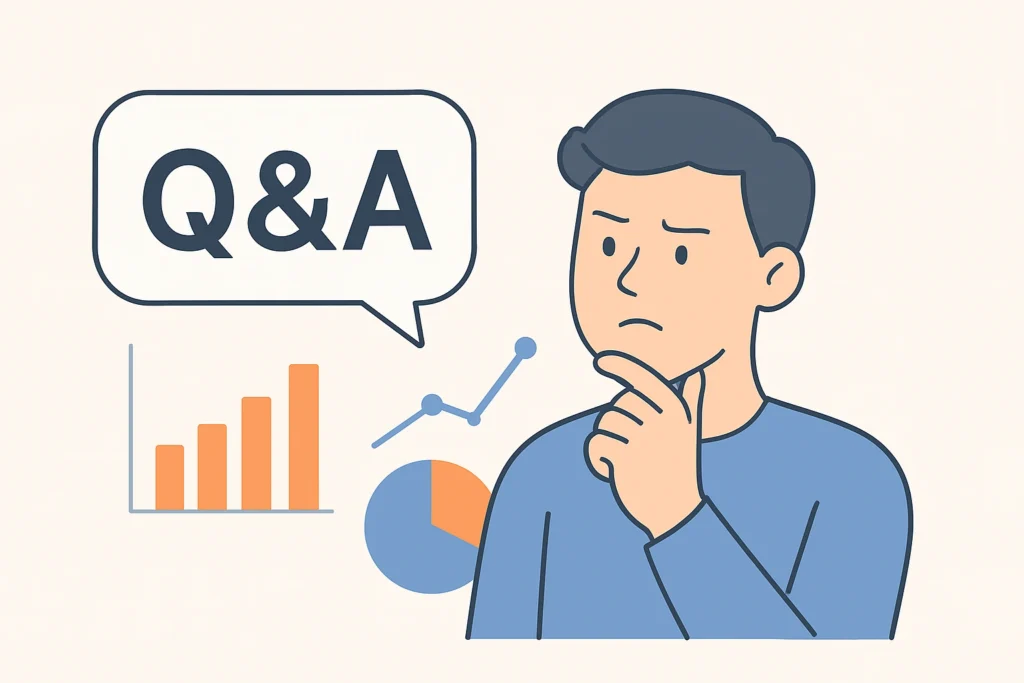
What are the Top BI Tools for Nonprofits in 2025?
The Top BI Tools for Nonprofits in 2025 include Zoho Analytics, Microsoft Power BI, Google Looker Studio, Tableau, and Metabase. These tools help nonprofit organizations track donations, measure program impact, and visualize data in easy-to-understand dashboards. Most of these BI platforms also offer free or discounted plans for NGOs.
Why do nonprofits need Business Intelligence tools?
Nonprofits use Business Intelligence (BI) tools to turn raw data from donations, volunteers, and fundraising events into actionable insights. With the right BI software for nonprofit organizations, NGOs can make better decisions, improve transparency, and demonstrate measurable impact to donors and partners.
Which BI tool is best for small nonprofits with limited budgets?
For small nonprofits or NGOs with tight budgets, Zoho Analytics and Google Looker Studio are the best choices. Zoho offers affordable plans with automation and AI insights, while Looker Studio is completely free and perfect for basic dashboards. Both rank among the Top BI Tools for Nonprofits for their value and ease of use.
What features should nonprofits look for in a BI tool?
When choosing a BI tool for nonprofits, look for:
1. Easy data integration (from CRM, spreadsheets, or donation systems)
2. Ready-to-use templates for donor and fundraising reports
3. Cloud-based access for remote teams
4. Custom dashboards for transparency and impact measurement
If your NGO works across multiple regions, choose tools like Power BI or Zoho Analytics for scalability.
Are there free BI tools for nonprofits?
Yes, several free BI tools for nonprofits exist. Google Looker Studio is completely free, while Metabase (open source) allows NGOs to host their own BI environment at no cost. These tools are ideal for small organizations looking to start their data journey without heavy investment.
How can BI tools help nonprofits increase donor engagement?
BI tools for nonprofits track donor patterns, campaign success rates, and engagement history. This data helps NGOs personalize communication, identify loyal donors, and forecast funding opportunities. The result? Improved donor retention and stronger relationships built on transparency.
Which BI software is best for impact measurement?
For nonprofits focused on impact measurement, Tableau and Zoho Analytics stand out. Both tools provide rich visual dashboards that clearly show outcomes, KPIs, and progress toward goals — essential for grant reporting and public accountability.
Can BI tools integrate with nonprofit CRMs like Salesforce or Zoho CRM?
Absolutely. Most Top BI Tools for Nonprofits, including Power BI, Zoho Analytics, and Tableau, integrate seamlessly with CRMs like Salesforce, Zoho CRM, or HubSpot. This makes it easy to combine donor data, project updates, and fundraising analytics into one centralized dashboard.
What’s the difference between BI tools and data analytics tools for nonprofits?
BI tools provide visual dashboards and insights for decision-making, while data analytics tools often involve deeper, technical analysis like predictions or trends. In the nonprofit context, BI tools are ideal for real-time reports and transparency, whereas data analytics focuses on strategy and forecasting.
How do I choose the best BI software for my nonprofit organization?
Start by defining your goals:
1. If you want ease of use, go with Zoho Analytics or Google Looker Studio.
2. If you need enterprise power, choose Power BI or Tableau.
3. For open-source flexibility, use Metabase.
The best BI tool is the one that aligns with your team’s skill level, budget, and data maturity.
Is Zoho Analytics good for NGOs in India?
Yes. Zoho Analytics is one of the most trusted BI tools for nonprofits in India, offering affordable pricing, local support, and compliance with Indian data laws. Its Swadeshi SaaS roots also make it a great alternative to Western tools like Tableau or Power BI for NGOs seeking a made-in-India BI platform.
How do BI tools improve transparency for nonprofits?
By using business intelligence tools, nonprofits can create dashboards that display real-time data on donations, expenses, and impact metrics. Sharing these dashboards with donors and boards improves accountability and builds long-term trust — a crucial aspect for modern NGOs.
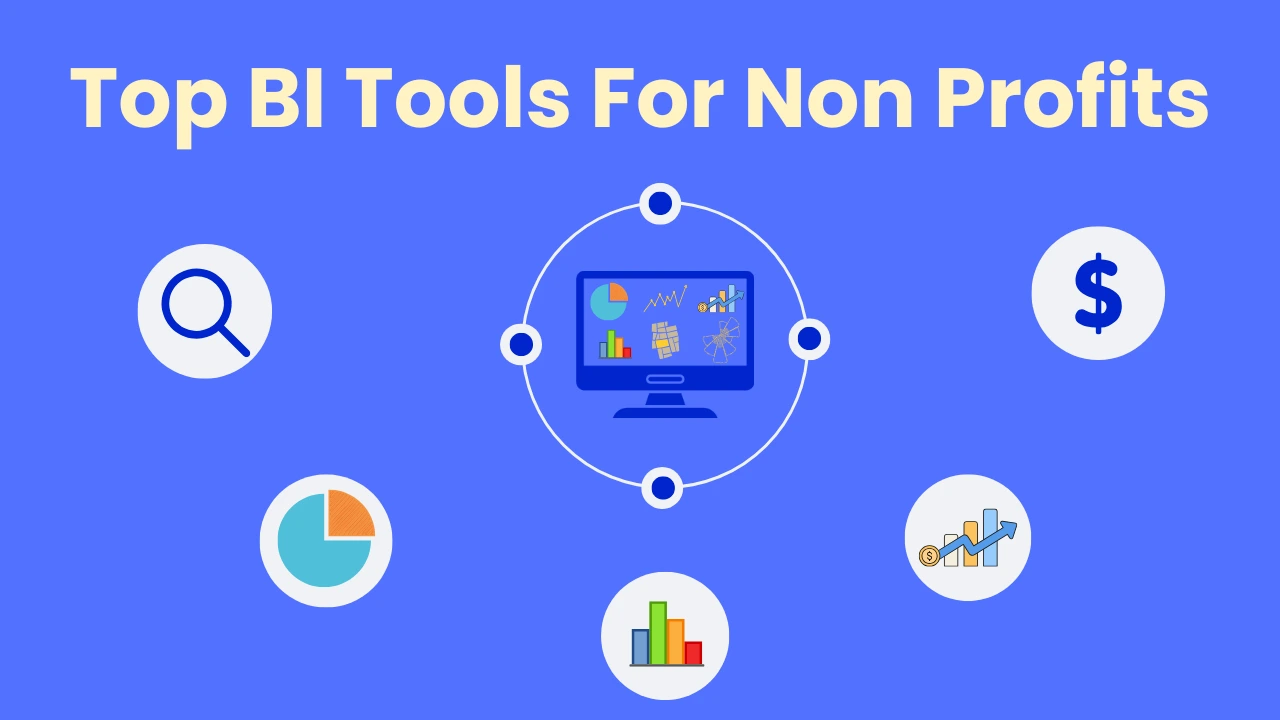

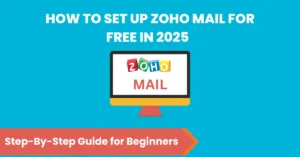
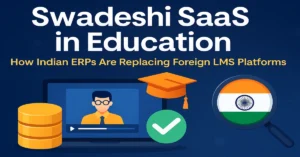
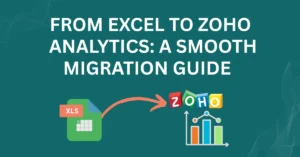
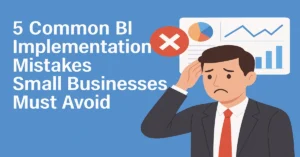
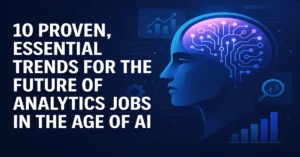

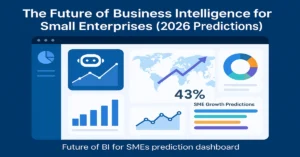
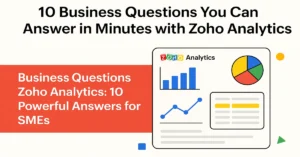
4 thoughts on “Top BI Tools for Nonprofits in 2025: Turn Data into Real Impact”
Comments are closed.